#this has been said before but still
Text
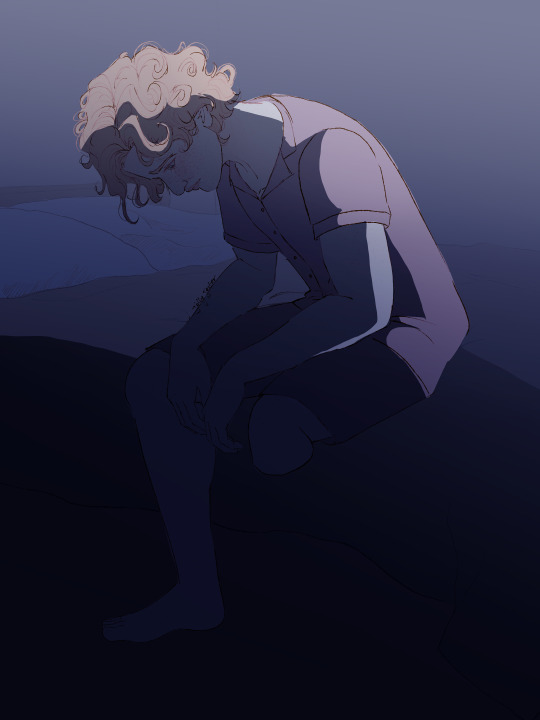
Mini Rant about Peeta's nightmares:
When he explains his nightmare to Katniss, he tells her they're mostly about her and he's okay when he knows she's safe.
I don't believe him.
Based on his paintings, I think his nightmares are a lot more often like hers than he lets on
But Katniss completely bases her self worth on how much she can provide for others.
SO I think Peeta tells one lie in the moment to tell the bigger truth:
Her existence is enough.
#This has probably been said before but#Also Im still so angry the movies got rid of his disability#the hunger games#catching fire#mockingjay#thg series#peeta mellark#thg peeta#katniss and peeta#everlark#hunger games fanart#fanart#clip studio paint#digital artist#digital art#artists on tumblr#jolly art
793 notes
·
View notes
Text
the level at which people are misusing the term "Never Again" in the far left absolutely infuriates me.
"Never Again" doesn't refer to the idea of no more genocides -- unfortunately people are evil and corrupt and seek scapegoats and destruction, there were genocides in the years following the Holocaust, there were genocides 10 years ago, there are multiple genocides going on as we speak
"Never Again" means we as Jews will pay attention to the warning signs, will not mindlessly allow antisemitism to fester and take over our communities, we will fight back. it means we will be proud. it means we will not let you hate us without a word of refusal.
"Never Again" is a warning for us, it is a reminder that what happened then can happen now -- is happening now. The Far Left doesn't get to use it against us. You don't get to turn our tragedies into hate-speech and antisemitic rhetoric.
Am Yisrael Chai
#abby speaks#that fucking NYT article made me rage so much#needed to get this out#if this somehow makes you pissed at me go ahead the unfollow button is right there#I have always said that Palestinians deserve a state and I have always believed that Israel has a right to exist#the lack of knowledge at these “protests” shocks me - people don't know which river or which sea; they don't know about the hostages#free gaza from hamas#we are allowed to mourn the “protests” started before we'd even had a chance to.#I will never ever forgive or forget the people that have made mourning still feel impossible#I am not about to sit here and say that the Israeli government is blameless#however if you didn't know that 1000s of Israeli have spent the past year protesting against Netenyahu's right wing government shut up#we need actual solutions; neither Israelis nor Palestinians are going anywhere#and you guys need to start calling out the antisemitism in your movement#I have my doubts on that actually happening and you'll never see me donate to a lot of these causes again#the goy left has lost my respect and my trust and now it only has my side-eye#sorry for the rant in the tags it's been an exhausting few months
348 notes
·
View notes
Text
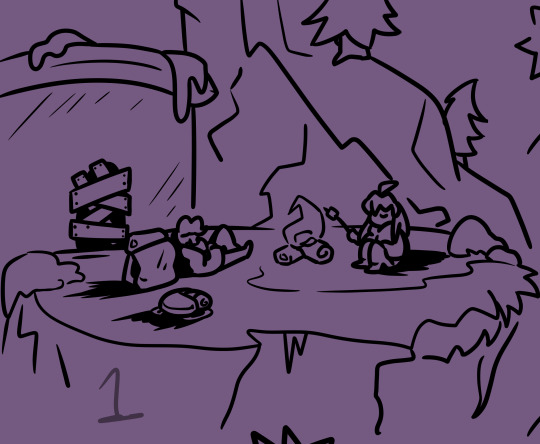



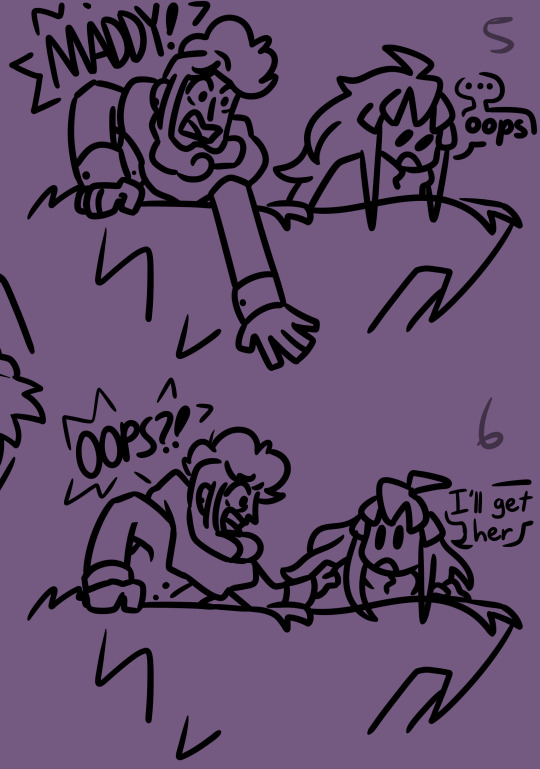

- ?? -
((Little bit ahead of where the blog was at, but I might as well post it now rather than any more time later, it was drawn during last year's blog anniversary.))
#intermission post#celeste#celeste game#madeline celeste#badeline#theo celeste#its a very cute comic i still like it#but i dont want to redraw it#im on another another hyperfixation so i think im gonna give up and say yeah it has been a hiatus#but i think ill still be drawing celeste in the future because it is comfortable#I do have the end of the 'story' written out#if i havent said before#but no motivation to draw it at all over [current hyperfixation]#I MIGHT finish up the wips i have here already#like this one
220 notes
·
View notes
Text
One thing about aspec (specifically asexual spectrum) Husk is that Angel dust could get to experience a relationship knowing that he isn’t being taken advantage of, something that he hasn’t gotten before, and that he really deserves.
#hazbin hotel#angel dust#husk hazbin hotel#huskerdust#hazbin spoilers#this has definitely been said before#i have more words about this but i’m still cooking
175 notes
·
View notes
Text
Taking a break from my usual programming to talk about Megara from Disney's Hercules being an awesome, flawed, complex, female character who has a very compelling arc.
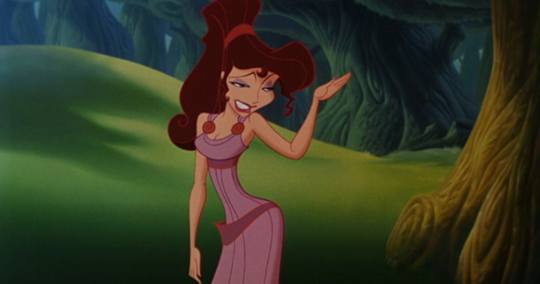
The backstory, given by Hades, is that Meg sold her soul to him so her lover could live, but he left her for someone else. This makes her one of the very few Disney women who actually has romantic relationship baggage and experience. She is also older than Hercules (I think unique in Disney) though I think she's still mortal and within a normal lifespan. But the point is, she thought had the "Disney princess" perfect sacrificial romance, but then was betrayed.
She does fall in love and begins to believe that Hercules is a really good person, which inspires her to be better as well. Then Hercules finds out that Meg has been working for Hades the whole time and is heartbroken and betrayed. Meg sacrifices herself to save him, JUST LIKE BEFORE, but this time, she did pick a better guy and her sacrifice was honoured. Hercules probably has a far better reason to abandon Meg than previous boyfriend, but he doesn't: he goes to the underworld, retrieves her soul, and then, in another huge personal sacrifice, opts to stay with her instead of joining the gods on Mount Olympus.
She is shown as cynical, amoral, and sarcastic; not seeming to mind that she's helping Hades attempt to overthrow the other gods. Even though she likes Hercules, she agrees to attempt to find his weakness when Hades offers her personal freedom (that seems to be lifted from the story of Delilah and Samson, by the way). While she is a slave to Hades, that doesn't fully excuse her actions because we learn that she can refuse to serve him. Her motivation seems to primarily come from her not really thinking humanity is worth saving after her betrayal.
I loved this movie so much as a kid and I think I imprinted on Meg like some sort of baby duck. I love her song, I Won’t Say (I’m in Love) and how she struggles to get over her cynical views of relationships and men. But now, I'm amazed that she exists at all. She's a femme fatal who tried to take down the hero of the story and she both survives and gets a happy ending! She commited the Ultimate Narrative Woman Sin: she used her sexuality against a hero! She does make a huge sacrifice, dying to save both Hercules and the world, but in most stories she would have saved him and died (permanently). Instead, she's completely forgiven and Hercules risks his life to bring her back.
I love her. I love her story. She's the best. Can we have more of her please?
#disney's hercules#megara#flawed female characters#I'm sure this has all been said before but man I love her#none of the greek mythology in this movie is accurate fyi#I watched the whole thing once to see if a single clip was accurate#and the answer was no#but it's still a great movie#trope subversion#also her relationship with Hades is amazing
181 notes
·
View notes
Text
btw! from twitter, some context from qforever and qcellbits convo
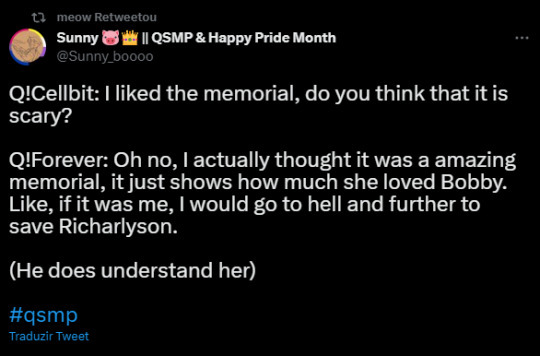
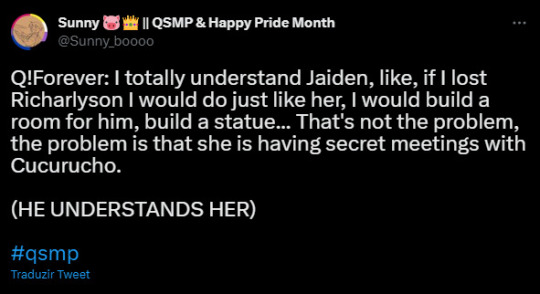
#qsmp#miscommunicatios bc of language barrier is gonna make me insane#as people has been saying around please take whats said in english by non native speakers with a grain of salt bc they sometimes#cant express their idea fully#qforever is very CLEAR abt what is his tought process in ptbr#but he fumbles a lot in english bc he doesnt have an extensive vocabulary to articualte well#(he even asked for cellbits help in the trial thing bc cellbit knows how to do this in english#but theire still more clear in ptbr#im asking this very nicely please consult anyone whos fluent in ptbr/esp/fr if youre a native english speaker and wants more context#before trying to come up with analysis and lore and character studies as well#bc the ccs explain to their audience in their native language important points abt their view#that can be very much lost#<- qbrs defender
412 notes
·
View notes
Text
also there's something to be said for how motherhood never diminishes katniss's worth or power. she's still valuable and strong in the epilogue even though we're seeing a softer and more maternal side of her. like she has kids because she finally feels safe enough to, but by the very act of doing so she's still rebelling against the capitol by stubbornly surviving, healing even, despite how many times it tried to destroy her. my god i love the epilogue
#the hunger games#thg#katniss everdeen#my words#books of all time!#ik this has probably been said before but i still want to say it
125 notes
·
View notes
Text
gosh someone sent me an ask about headcanons that got me gushing about homestuck
the ability of fans to project their unique interpretations onto characters is one of my favorite parts of homestuck. i believe its the primary reason why homestuck is STILL drawing new fans from across the globe after all these years; canon is very open and malleable. the characters are iconic yet they have few canon physical features, so you can interpret them however you like, and they are ALWAYS recognizable. and multiple universes/timelines is an integral theme in homestuck, so it's easy and natural to imagine tons of AUs and side stories and alternate timelines and endings.
i adore exploring the huge variety of headcanons and aus and art styles and pairings and cosplay and fanfiction and games and animations and merch and websites fans create! there is still stuff from years ago i havent seen, and new stuff all the time. it's an endless treasure chest of fan content, and there's a niche for every interest. i think as time goes on homestuck will continue to endure and be a crucible for people to find their unique creative voices and niches. i'm... gonna be a homestuck forever...
#not art#but ABOUT art#all this has been said before but i think it is so true i just want to say it myself#i just woke up from a 6 hour nap hi#homestuck has had a huge influence on my visual art and it was such a good place for baby me to spread my creative wings#and after all these years it still is!!! it just gets me so hyped creatively ykwim#infinite headcanons in infinite configurations
147 notes
·
View notes
Note
I swear I have read your big post regarding Peter Parker's neurodivergence and why it is best to avoid labelling him, but he definitely has a weird brain
Can't find it and feel kinda sad about it cuz I deeply related to it
i know exactly which post you're talking about and i can't find it either! i've raked through my archive, and it's just - nowhere to be seen. i think tumblr eated it (it happens.)
really, tumblr's search functionality is so so useless, i don't know what to tell you. there are plenty of keywords i can search to find it that post, but the search functionality actually just does not work!
undiagnosed audhd-addled peter parker, my darling, my light, my life, my everything.
i think peter parker's such an interesting creature to write, because a lot of people will point to a certain behaviour about him and say "this is an autistic thing, right?" but a lot of those behaviours are actually, in my head, tied to certain traumas in peter's life too.
people say "oh, the food thing, peter's a picky eater because he's autistic" and yes, absolutely. but also it's tied to his trauma with his parents.
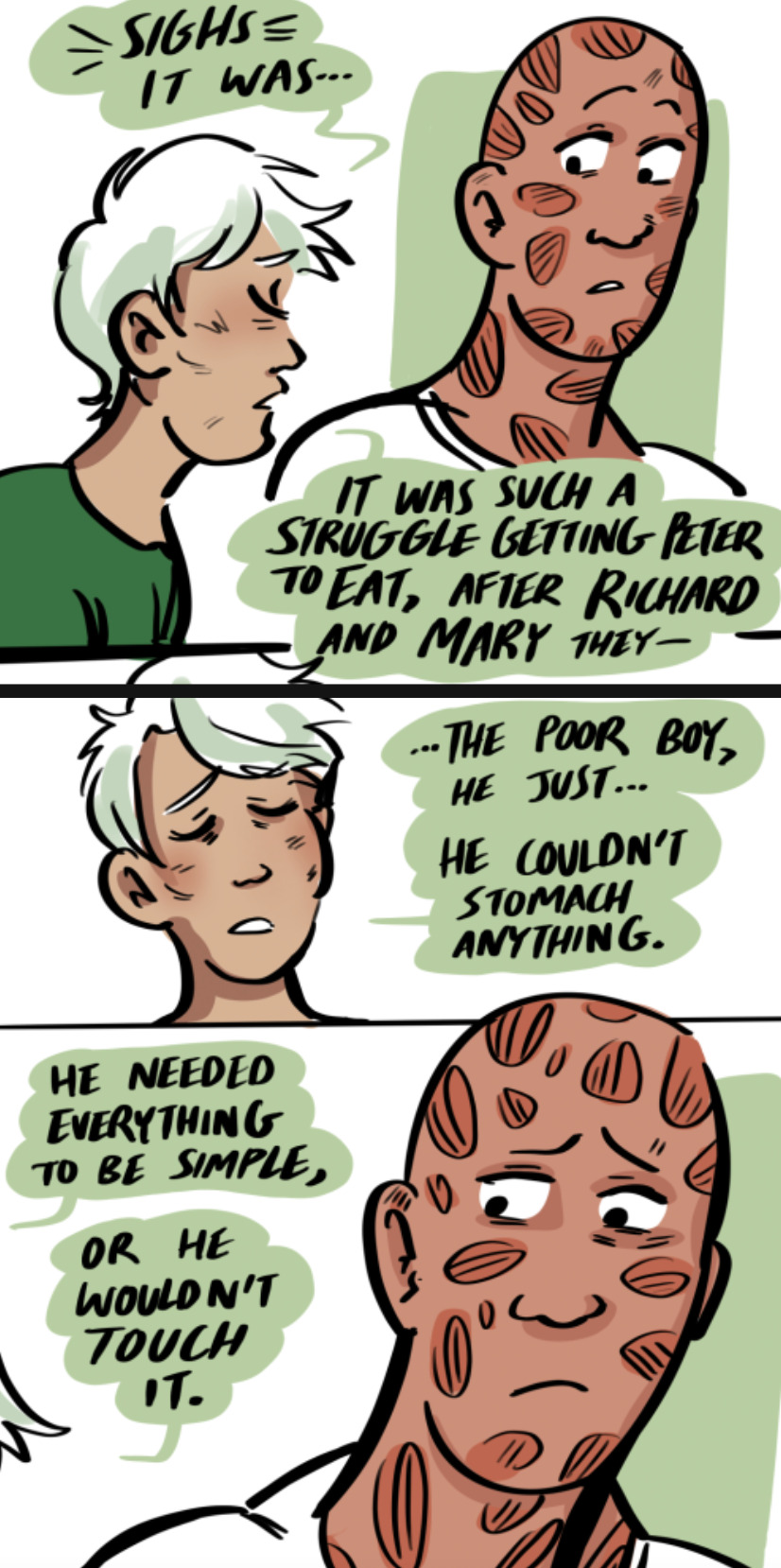
peter gets overstimulated, and yes, it's an autism thing, but also he was bitten by a radioactive spider and his senses are dialled to 11.
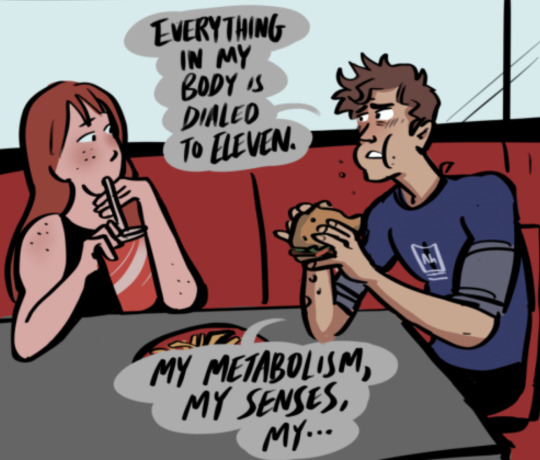
it's a similar case i've found for myself, too – where a lot of friends i have kind of diagnose me because i have autistic traits, but actually - i'm hesitant to claim the label or pursue diagnosis because, actually, i know where these certain behaviours come from, and they come from certain traumas. there are events i can pinpoint in my life and say "yep. that's where this behaviour comes from."
so - i think there's a lot of overlap between trauma and autistic traits. the brain is very complex! i think the reason for that overlap is maybe as simple as the fact that people with autism and people with trauma are both doing the same thing - developing behaviours to protect themselves or soothe themselves. so - i think it's nice to be able to see a character like peter parker, who may or may not be autistic, but recognise behaviours in him and see yourself in him.
people who go undiagnosed for whatever reason - people who are really good at masking - so good, in fact, that they have no idea they might be on the spectrum - everyone and anyone at all can look at peter parker and recognise themselves. because i think we discredit the thought that every single brain does the same thing! develops certain behaviours in order to survive. every brain has that same software - we've just all been faced with different hardships that we need to overcome, and that's were all the differences come in.
autism is a spectrum, i guess - everyone falls into it to some degree. and i think events in your life probably push you along on it. but i don't know, i didn't study brain science. probably what i'm saying is very stupid and uninformed. of course there's brain chemistry involved. but i know people in my life living with autism and certain events in their life have exacerbated certain behaviours or made coping with it a lot more difficult. so maybe trauma is a catalyst.
#a lot of my traits have been exacerbated lately and i remember it was much easier for me before#and some of my friends have said “oh it's because you've been masking too long and now you're facing autistic burnout.”#and that made sense to me i think.#but then i found out about the stress thing. me overproducing stress hormone. and that's a very physical thing.#and that explains why i've been overstimulated more than usual lately. and why everything feels like too much.#and i wonder how many of these traits of mine are going to subside once i have lamar removed#and it makes me wonder a lot of things. and it's so weird how much your brain is tied to your biology.#i wonder how much i'll change. i wonder how i'll feel. i wonder if i'll still feel like me. i wonder how much me is me right now.#and how much of me is being altered by weird freaky hormones. who am i?? who will i be??#i'm almost looking at this as like. a superhero origin story of some sort. like this is my spider-bite moment. maybe.#will i be different? will i cope with things differently?? now that my body isn't fighting something anymore??#maybe i'll be normal. i don't know. i don't know.#i don't know what it'll mean for me.#but all of these things mean i relate to peter parker in a certain kind of way#i don't think you have to be diagnosed with autism to recognise and empathise with those traits i think#i think everyone can see themselves in peter. and i think that's the benefit of having characters that aren't diagnosed.#because there's so much overlap in the human experience. and certain feelings aren't exclusive to just one group of people.#peter has such a rich identity actually. it's an autistic thing. it's a queer thing. it's a jewish thing. it's a trauma thing.#there are so many overlapping parts of peter's identity that inform who he is and how he behaves and it's never just one thing.#it's a product of all of his things.#just like me! just like everyone.#so me? i guess i can be a million things. you can explain what i am in a million different ways.#a hundred different psychologists can all come up with different ways to explain why i be the way i be.#i don't think it's something that can be simplified.#sorry wow. i'm really going off here in the tags.#i hope people don't think i'm stupid. i don't know brain science. i'm just philosophising as usual.#sci speaks
58 notes
·
View notes
Text
Sure, you’ve heard of the Fatal Five… But have you heard of the Scam Squad?
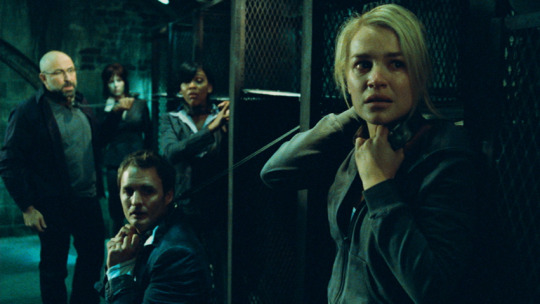
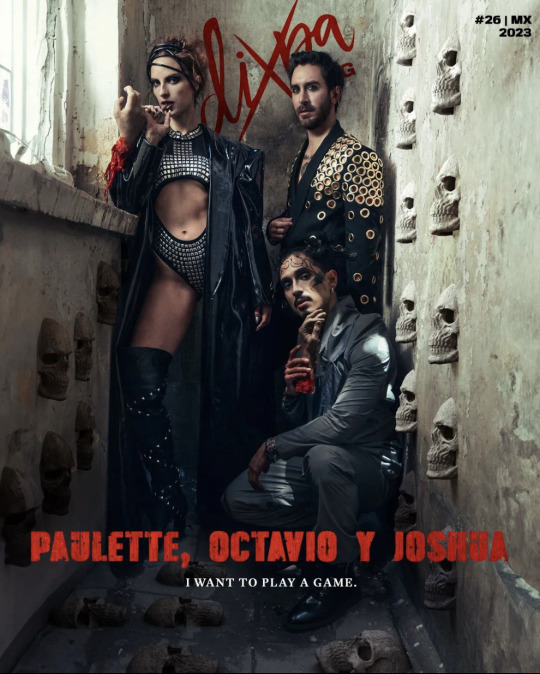

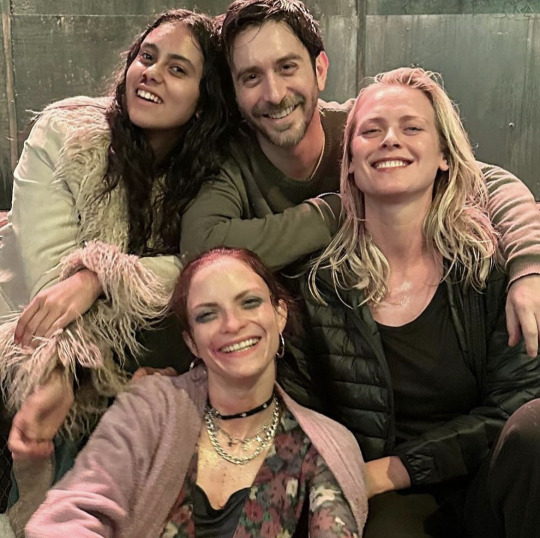

#this 100% has to have been said before#i’m still not over the characters of saw x#the scam squad#scammer squad#saw#saw x#saw franchise#saw movies#saw films#saw 2023#saw 5#fatal five saw#sawposting#I need more content on them#WAHHHH
66 notes
·
View notes
Text
Something about how Heart is being compared to mythology, Minds referencing the bible & Soul being the one to use both of those things
#its so fun to my brain. its interesting to me#idk if that actually means anything i just find it neat#Heart being referenced as Juno [the greek moon goddess]#Mind referencing the bible [he does it mainly in TME but also the whole judgment & punishment talk as well]#then there's Soul with the end of Dream & all of Two Wuv [also a couple extra lines in TSE NMtK & such]#this has probably been said before but i still find it interesting#also to add in. Whole does none of those things really#not including some songs since they're more CJ centric/not Whole based [if that makes sense]#but Whole is much more literal non-metaphorical way of explaining things/singing#the most he talks about anything that's a metaphor is like the Time Machine bits in TMR#THO whats also kinda fun is that when he sorta talks less literal. its in the back & forth part in TWWaY#like showing all separate parts of HMS are there but as one person#again idk if im making sense#im rambling now but its interesting to me#chonny jash#moss post
81 notes
·
View notes
Text
Before the semester kicks off and murders me, @disniq asked for my essay on Jason Todd and hysteria. So, without further ado, here is an actual essay (fucking dissertation) because I refuse brevity. It is extremely long. I’ve split it into sections so you can find the section header and read what you want. This does not encompass all the narrative trauma themes and lived experiences that this boy holds, just specifically hysteria.
Jason Todd, The Hysteric & Bruce Wayne, The Batman
I think it’s a common reading that Jason Todd is girl-coded and the patron saint of victims, at least within the circle that I’ve fallen into within this fandom. There are plenty of meta discussions on why those readings stand, so I’m not going to reiterate them. A pillar of him being girl-coded and someone trauma survivors have latched onto as one of our own has to do with being written in the context of hysterical femininity. And let me just say, I don’t think that writing was done in a way that he was intentionally coded as hysterical, but it is a function of our patriarchal society that this coding was used on him albeit without the explicit purpose of writing a hysteric story.
For the purpose of this post: the word woman includes ciswomen, transwomen, and any person who is socially positioned as a woman regardless of gender identity. I include the positionality here because anyone can experience misogyny and sexism depending on the perception of the perpetrators either interpersonally or systemically.
The History and Context of Hysteria
To understand the context, we have to look at the history and oppression of hysteria. Hysteria (in the modern context of psychology) emerged in the nineteenth century and is difficult to define by design and often applied to traumatized, unruly, and broken women. The main patriarchs who contributed to hysterical study were Jean-Martin Charcot and Sigmund Freud. I only mention this because it’s important to know their names moving forward for any of this to make sense. The beginning of this started with Charcot literally putting women whose lives had been marked by rape, abuse, exploitation, and poverty on display in his Tuesday lectures (which were open to the public) to show his findings on hysteria. This was actually seen as restoring dignity (fucking yikes) to the women because before Charcot these hysterical women were cast aside and not treated at all. In Charcot’s work, the women’s speech was seen as simply “vocalization” and their inner lives, their stories, their words, were silenced. After hearing a woman cry for her mother during one of the public sessions Charcot remarked, “Again, note these screams. You could say it’s a lot of noise over nothing” (Herman).
This led to Freud, Charcot’s student, wanting to surpass his teacher by discovering the cause of hysteria. This was disastrous. Freud started with listening to the hysterics. In doing so, he learned and believed them about the abuse, rape, and exploitation of their pasts. He then published his work and gave a lecture on it. The work rivals even contemporary psychological work on trauma in it’s level of compassion, understanding, and treatment of survivors. However, he was then labeled a feminist (this was all happening during the first wave of feminism) and professionally ostracized. How in the world could these aristocratic French men be sexually abusing their wives, sisters, and daughters??? Insanity, truly. And... This always fucking gets me. He recanted his work and then told his patients they all imagined it because they wanted to be sexually abused by their husbands, brothers, and fathers. This set back the study of trauma by literally a century. One colleague called his work “a scientific fairy-tale” simply because he had the audacity to believe victims. Also, I want to point out that the famous hysteria case during this time was the case of Anna O and she was ultimately villainized by the entire psychological community for going into crisis after her care provider abruptly ended their therapeutic relationship after two years of DAILY sessions.
Anyway. We can see how the power of these men over vulnerable women silenced, pathologized, villainized, infantilized, and used male ‘logic’ to completely destroy their credibility and lives under the guise of care and hysteria. Even when credible men lend their expertise and voices to the victims, their voices are silenced. This particular iteration of hysteria lasted over a century, and we are still dealing with the consequences of these actions and ideas within our social construction, medical and mental health care, interpersonal relationships, and more. Patriarchal pillars such as hysteria don’t die. We saw it move from hysteria to schizophrenia (which used to have the same symptoms of hysteria before the diagnosis changed in more contemporary psychology) after this which led to widespread lobotomies and electroshock therapy (my least favorite case of a lobotomy being done is on a woman who was diagnosed with LITERALLY ‘narcissist husband’) to depression in the 40s-50s with the over prescription of benzodiazepines to house wives to keep them in a zombie state (these prescriptions were sometimes double and triple what we take today with the intent of medical catatonia). In my opinion, as well as other counselors within the feminist therapy theoretical orientation, we are currently seeing it with the emergence of borderline-personality disorder. Think about how BPD is treated and demonized for a second. I professionally know therapists who refuse to work with BPD clients due to this villainization and just fucking gross perception of victims.
These are just the highlights, but it shows the history of hysteria. There have been centuries of women being marked as hysterical and the cures have ranged from lobotomy to bed rest (which sounds not so bad but read the Yellow Wallpaper and get back to me on that one). While the Yellow Wallpaper is fictional, the life behind it was not. After the traumatic birth of her child the author, Charlotte Perkins Gilman, was remanded to bed rest by the authority of her husband and doctor. Within the sphere of medical control, hysterical women are often treated as children while their doctors make decisions for their mental well-being without consulting them, or they hide the truth of their procedures for “the woman’s own good” and because “she’s hysterical and wouldn’t comprehend the logical need for this.” She then had a mental break due to the treatment. Again, we see hysterical women being silenced, infantilized, discredited from their own experiences, and under the narrative control of male logic and voices.
Hysterical women have often historically been seen as beneath men, except for when they’re dangerous. Listening to victims is inherently threatening to the status quo because all trauma comes from a systemic framework. The framework that upholds patriarchal power. It’s easy to see why that would be seen as dangerous to powerful men. We saw this with the European witch genocide in which oppressed women were targeted and wiped out under the excuse of what was considered women’s work. (Before this time, witchcraft wasn’t tied to any religion and was mostly just seen as women’s work. It was targeted specifically to have an excuse to persecute widows, homeless, disabled, and vulnerable women who no longer had men to reign over them during a time of political unrest and scarce resources). This time period saw hysterical and traumatized women demonized as dangerous, evil, immoral, hypersexual, and supernaturally wily. A threat to the moral fabric of society.
(Interesting history side note: this caused the view of women’s base traits we have today. It stemmed from the Victorian era that came after this time period in which women learned if they behaved a certain way, they would be spared the stake. For example, before the witch trials, women were actually seen as the ones with unsatiable sexual appetites, something we culturally prescribe to men now.)
Notice how none of this has to do with the actual abuse that happens to the women, but instead the labeling and treatment of women when they are already showing the symptoms of abuse, trauma, control, exploitation, and rape.
Jason Todd, The Hysteric
So, how does this relate to Jason Todd? To say that Jason has experienced trauma would be an understatement. Extreme poverty, loss of parent to death and addiction, loss of parent to the justice system, parental abuse, manipulation, witnessing violent crimes, witnessing the aftermath of sexual abuse and assault, arguably (not explicit in the text) his own sexual trauma, witnessing the dead bodies of victims, a violent death, and subsequently a violent resurrection. There’s also an argument to be made for being a child soldier and how that is romanticized up until he dies, but the text does not treat this as traumatizing.
Now, I’m not going to dive into the trauma he experienced. The purpose of this is only to look at how he’s framed as hysterical in the narrative, and as I stated, hysteria was a word slapped on women after they tried to talk about their trauma or exhibited symptoms (or were just unruly women). Jason does embody many facets of the victim experience and this is just one of them.
Feelings vs “logic” - Firstly, it is really hard to talk calmly about things that you carry, your experiences, your trauma, and things that specifically harm you. It is easy to talk calmly about things that don’t. This is why there is an abuse tactic of gaslighting or silencing victims by framing their very real reactions to harm or their triggers as abuse, this is known as “reactive abuse.” This tactic is also employed in oppressive settings where the privileged group will often default to ‘winning’ a debate by being able to remain calm while the marginalized group whose life, personhood, etc is being harmed by the things being discussed and are unable to have a sterilized, emotionless debate.
Both of these settings fit Jason nicely within the moral context of vigilante comics. He fought back, he didn’t lay down, and he will do what he deems as necessary to protect himself and others from his fate. This, however, is framed by Bruce and others as being just as bad as his murderer or even just as bad as Joe fucking Chill. To put this in perspective of a real world equivalent. Combine every billionaire on this planet into one person and instead of their shitty business practices murdering people, they did it with their own two hands. And due to their resources and political power, they would never, ever stop killing or be reasonably contained. More people would die with absolute 100% certainty. Would killing that one person make you equally bad as that person or violating the sanctity of life? That’s the moral question that Bruce puts onto Jason. While the moral question inherent to Jason is actually, is there a line worth crossing to provide reasonable safety (for yourself or the nameless community)? There is actually a difference between those two questions and the reactive abuse framing is certainly a choice. Also, it is funny to me that a man with the amount of power Bruce has (and frequently misuses) can lecture a murder victim on the misuse of power and morality. Are we supposed to be agree with his stoic, philosophical lecturing to a marginalized, abused, murder victim? (yes, we are). Bruce leverages (personal) philosophy against victim’s voice for their own safety, and take a wild guess which one is framed as logical and reasonable.
Jason’s morals come secondary to Bruce’s philosophy in a universe where there is still harm being done (but it’s an acceptable harm). Why is killing the line? Bruce is regularly destroying families and lives by feeding them into the prison industrial complex while supporting it with his whole chest. Or he’s disabling and seriously maiming people with the level of violence he uses.
Crying - Throughout the entire story of Under the Red Hood, we never once see Bruce emote while interacting with Jason outside of tight grimaces. With the exception of the shock he shows at the Joker’s life being threatened, which... Okay, suuure. We never see him cry during any of their interactions, but we do see Jason cry. Specifically, we see him crying when he’s at his most emotionally vulnerable and physically dangerous to the toxic male power fantasy. This kind of vulnerability is rarely shown by male characters, and when it is, it’s usually done with a mist of a tear in their eyes or their face is hidden. There are a few narrative devices that allow men to cry, but they are the exception rather than the rule. Usually, it’s to play for laughs, infantilize, or emasculate. Here, we see Jason combine the violence of a bad victim, bucking the system of power, and fully crying. Just slide right into that hysterical coding like a glove. Jason often shows his feelings entirely. Time and time again, the readers have seen Jason have breakdowns, cry, and be overcome with grief. This is tied to his portrayal as hysterical and unstable in the narrative, but in actuality it shows his capacity for love and how vastly impactful his death was.

This fits nicely with the next point that Jason fits into the hysterical box. Love is framed as one of his key faults. A son reaching for his father.

Love - One of Jason’s defining features is the amount of love and compassion he holds. He’s willing to put up with any treatment, shoulder blame, and sacrifice himself for others to almost an unhealthy degree. However, this doesn’t extend to what he defines as his baseline safety. This one line of safety is the one thing that can’t be crossed, even with all of the love he feels for his father. He desperately wants to feel connection, have a family, and be loved in return with the same unwavering ferocity love that he gives. This is such a fucking key part of the victim experience, especially victims of childhood trauma. The desperation to just be chosen. He’s raw and honest with his reasonable expectation for love to provide safety for him and that is framed as hysterical, needy, unstable, naive, and fucking childish. Victims know what they need to have safety, and this framing as Bruce knowing what’s best for Jason and literally giving a cold shoulder to his needs is disgusting.
Less than - Jason is portrayed as less powerful than Bruce even though they have similar expertise. There are so many instances of this that if you just open any media they both appear in, you can close your eyes, point, and land on an example. It makes me die laughing every time I remember that the Arkham games made Jason just one inch shorter than Bruce. Like, they can’t even be the same fucking height, that’s the level of insecure masculinity surrounding this relationship. Jason cannot and will never be able to be on par with Bruce because of his hysterical femininity and the power of Bruce being the self insert for the toxic male power fantasy. This power dynamic applies to the other batkids as well, but specifically in Jason’s case there is an element of hysteria. The reasons change because he’s so inconsistently written but usually he can’t surpass or even meet a stalemate with Bruce because he’s too emotional, he’s unstable, traumatized, and simply Bad. It’s even explicitly stated by Alfred in Under the Red Hood.
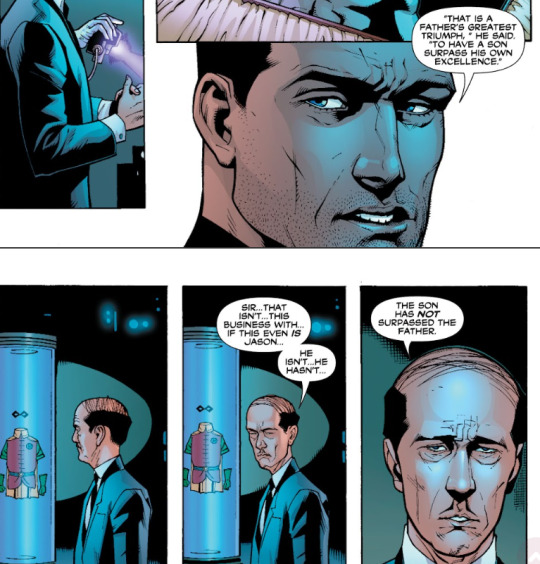
Victim blaming - Jason deserved to die because he didn’t follow orders. Jason deserved to die for not following his training. Jason deserved to die because he was an angry Robin (oh no a child had an appropriate reaction to sexual violence). Jason deserved to die for being human.
Infantilization - Jason is repeatedly infantilized in contrast to Bruce. When given the ultimatum at the end of UtRH, Bruce speaks to Jason like a child, or a bad dog. Ordering him to do things like, “enough!” or “stop this now.” Bruce knows what’s best for Jason (and for everyone in the entire world), we should really just take his word for it and not the victim’s. Imagine staring at a 6 foot wall of a man and scolding him like a child. Beyond that, as mentioned above, his views of love and safety are framed as childish. Even though they are actually leaning more toward collectivism rather than the rampant individualism that Bruce so strongly defers to. (also, just a side note, collectivistic methods in healing from trauma is actually the only scientifically reliable way to heal. Every other method has absolutely abysmal results and higher rates of relapses.)
Silenced and Safety Villainized - Jason is silenced in his own story, acceptable and honored when he was dead and met with vitriol in life. All of the love given to him as Robin turns to ash as soon as he collides with Bruce’s power and morals. I think any survivor can relate to the experience of being told that what happened to them was a long time ago and it’s time to move on. Or even that they’re leveraging their own safety to get what they want in a manipulative way. Regardless of whether or not there was any accountability or justice for the harm done to them. Alfred asks Bruce if he should remove Jason’s memorial in the cave like two seconds after learning of his resurrection because Jason’s methods of securing safety for himself and using his own voice to define his story. Bruce was able to tell Jason’s story when he died. He was able to memorialize, grieve, and ultimately define Jason’s story because Jason wasn’t there to speak for himself. When Jason does speak for himself, he is villainized and literally stripped of his past significance as Robin (or a good victim) by Alfred within seconds. This is reflected in real life with adoptee advocates speaking about how adoption is unethical/harmful/traumatizing and subsequently being framed as ungrateful, selfish, etc. They were little perfect victims without voices before they grew up and could speak for themselves.
Erased - Gestures at the entirety of how Jason is either talked about or completely erased during the 90s Tim Robin run. He wasn’t convenient to talk about, as victims rarely are. This also ties into how Steph’s death was erased and Babs was written like she “won” at trauma by simply... beating it???
Dangerous - Jason is framed as threatening the basic fabric of society (in a story with vigilantes this is hard to do, so they have him oppose the no-kill rule, and then doubled down on Bruce’s characterization of no-killing). Anything that bucks the status-quo is usually marked as villainous in mainstream vigilante/superhero comics, but this is a step beyond that into the interpersonal and political sphere. Hysterical women are often framed as dangerous, villains, snakes, and treacherous (the other side of this coin is weak, pathetic, and pitiable) because they are victimized and then have the audacity to do something to the system about it. Whether that be the system of their immediate families or the political sphere. I don’t think it’s a coincidence that Jason was paired with Talia in Lost Days to hammer this point home to the reader. It could’ve just as easily been anyone with access to the Pit that rescued him, but no, we had DC’s favorite brown, treacherous, venomous, female punching bag.
Bruce Wayne, The Batman
Bruce fits well into the father, enforcer, and logical man slot in Jason’s hysterical story. There is a history of ownership throughout women’s history when it comes to their subjugation to men. Women actually couldn’t be put on trial before the witchcraft genocide because they weren’t seen as legally a person. Their male owner would be put on trial instead. Women would go from being owned by their fathers to their husbands after entering marriage, the most dangerous woman being one who isn’t owned (orphaned, widowed). Bruce does treat (and even thinks) about Jason like he’s something that he owns. He’s his protege, his son, and his responsibility.
The narrative function of Bruce as a perpetrator in Jason’s story.
“The perpetrator asks the bystander (reader) to do nothing. He appeals to the universal desire to see, hear, and speak no evil. The victim, on the contrary, asks the bystander (reader) to share the burden of pain. The victim demands action, engagement and remembering” (Herman).
Bruce does remember what happened to Jason. He keeps a permanent memorial to his dead son. However, this doesn’t translate into any kind of tangible action. He doesn’t do anything to actually stop the murderer who took his son’s life and he continues to throw child soldiers at the problem of crime (how many children have died for the sake of his no-kill rule at this point?). When met with the reality of his inaction, he fits into the perpetrator’s role like a glove:
“In order to escape accountability for his crimes, the perpetrator does everything in his power to promote forgetting. Secrecy and silence are the first line of defense... If secrecy fails, the perpetrator attacks the credibility of his victim. If he cannot silence her absolutely, he tries to make sure that no one listens... From the most blatant denial to the most sophisticated and elegant rationalization... One can expect to hear the same predictable apologies: it never happened; the victim exaggerates; the victim brought it upon herself; and in any case it’s time to forget the past and move on. The more powerful the perpetrator, the greater his prerogative to name and define reality, the more completely his arguments prevail” (Herman).
I think it is simply fact at this point that Bruce is the head patriarch in Gotham if not, arguably, in the entirety of DC. That level of power in the narrative cannot be ignored, especially when faced with the very real, screaming voice of a victim that Bruce uses all of that power to silence. Bruce, because of his status as patriarch, default protagonist, and self-insert for the toxic male power fantasy, has the ultimate power to name and define reality. Especially to the reader. Bruce doesn’t deny what happened to Jason, because that’s physically impossible to do. But what he does do is ensure that no one listens to Jason, discredits him, and rationalizes his own inaction, actions of violence towards Jason, and victim blames.
Here’s Bruce using the most base form of denial and victim blaming:
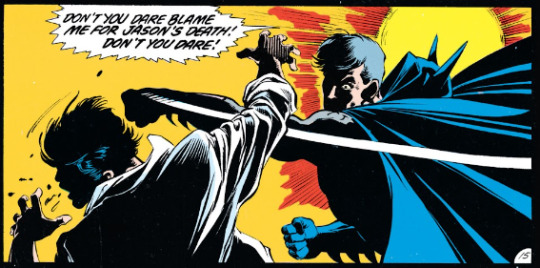

After this panel, Bruce also revokes Dick’s access to his childhood home simply for asking a question.
This theme extends to other members of the batfam because of Bruce’s narrative power over them. It’s why we can’t have Dick, Steph, Babs, or even Damian step in and relate to Jason’s trauma or vindicate him. Even when we, the readers, can see parallels and wonder why these conversations or bonds aren’t forming. Jason HAS to be a lone wolf because he is hysterical and a threat to the system of power. This also shows why most of his runs in group settings outside of the batfam fall apart or fall flat. If he was humanized by any other character or had his trauma validated in any actionable way, it would be recognizing the failure of the toxic male power fantasy. The readers are not supposed to see the flaw in this system that allows the bodies of children to pile up and sympathize with one of their voices. It would be a crack in the system of power that exists not only in the source material, but very much within our real world.
Side note: Jason is allowed to interact with others in a wholesome and validating way when he no longer threatens the systemic power of Bruce. When he is silenced by the writers and plays the “nice victim” (like Babs does), he is allowed connection. Only when his healing is done in a way that doesn’t demand action and is only his personal responsibility (gotta love the rampant individualism). If he is hysterical, demands action, and asks for someone to be held accountable for his death, he is shoved away into a lone wolf box. Examples: Gotham Knights (from my very basic understanding, I haven’t played the game, only seen play throughs) and WFA. Victims are acceptable if they do their healing in a neat little box and stay there, but hysterics are the ones who step outside of that box.
Red Hood, The Political Voice of Hysteria and Trauma
Red Hood is deeply political in terms of hysteria and trauma. Herman stated that victims and those that authentically care for them or listen to them intently (whether that be interpersonally, clinically, or professionally) are silenced, ostracized, and discredited. Survivors need a social context that supports the victim and that joins the victim and witness in a common alliance. On an interpersonal level this looks like family, friends, and loved ones. However, trauma is systemic and the social context mentioned above must also be given on a wider social scale. For this to be done, there had to be systemic change and political action. Jason had the interpersonal social support and witnesses to his trauma ripped from him by Bruce. So, we see him move onto a systemic level of addressing trauma in his own political way. He literally cannot escape Bruce and this constant trigger because of Bruce’s philosophy and just... fucking power to define reality... being re-enforced constantly in DC no matter where he tries to go. So, he tries to heal by taking the systemic issue of perpetrators who cannot be held accountable or have fallen through the cracks of accountability into his own hands in a very personal way. A one man political movement.
Whether his methods are moral or ethical doesn’t really matter in the overall framing him as hysteric. He simply has to be opposed by the male power fantasy in some significant way. This shows that the goals, needs, and work towards victim’s and the marginalized’s freedom is dangerous, doomed to fail, and ultimately unethical if the victim is framed in a villain light instead of the more pathetic/pitiable iteration of hysteria.
You can see how this is not only problematic but also reflects the real world values instilled in arguments against human rights movements (which are intrinsically tied to victims rights). Defunding the police is dangerous, the MeToo movement is dangerous, abolition is dangerous, trans rights are dangerous, etc etc etc. Think of the victims voices tied to each of these movements and how they are integral to the real change offered by these political movements. You can’t have human rights violations without creating victims. And you can’t have political movements surrounding human rights without listening to victims.
We can also see how the individuals within these movements are ostracized, villianized, and often silenced (sometimes ultimately silenced with death) because they rally against the systems of power that victimized them. The framing of traumatized, vulnerable people as hysterical is integral to upholding the system of power that traumatizes and harms them.
A popular comic book movie adaptation that highlights the importance of Jason’s hysterical framing and how it impacts the political narrative/how he is written is V for Vendetta. To be fair, it received an insane amount of backlash by conservatives (not within leftist or liberal spaces) for V’s methods in over throwing fascism, but only because of the movie’s release date being so close to 9/11. V and Jason have many parallels, it’s only the lack of hysterical framing that makes V more palatable to the viewer. We are told, not shown through behavior, that V is traumatized by his past and he does not pick a fight with the protagonist that functions as a toxic male power fantasy. He is the protag, with his version of Bruce being men who are not framed in a sympathetic, heroic, or relatable light.
Additionally, there is literally an unemoting mask standing between the viewer and V, whereas Jason takes off his helmet to allow the reader to see every aspect of his trauma and pain. V readily dehumanizes himself into an idea, rather than a person. Whereas Jason screams to be seen as a person in a very hysterical way. So, we can see how the framing of Jason as hysteric against the logical, heroic man greatly impacts how the audience reads him when contrasted by a very similar political story/character who uses similar (and arguably more violent) methods to meet his ends. (This just made me realize that I would die for a Jason adaptation written by the Wachowski sisters).
Jason’s work as Red Hood is seeped in leftist, victim, and community centered politics. His portrayal as a hysterical antagonist (at best an anti-hero) is rooted in misogyny and upholding patriarchal, capitalist, and the prison industrial complex systems of power. He is the righteous embodiment of “the personal is political” for victims. Even his Robin run draws attention to and shows correct, angry reactions to the system of patriarchal power in sexual violence.
Patriarchal Writing and Enforcement
Jason is girl-coded and hysterical because he’s supposed to be emasculated, discredited, and disliked by the reader. He serves the narrative function of boosting the toxic male power fantasy of Bruce and in doing so, the writers use one of the oldest tropes in the book (one that we have all subconsciously been taught since birth) to get the reader on their side. Make him a hysterical woman.
References: for anyone interested in furthering their understanding of any of the concepts mentioned above and to, you know, use sources for my own writing.
Barstow, A. Witchcraze
Bondi, L., Burman. E. Women and Mental Health: A Feminist Review
Freud, S. The Aietology of Hysteria
Gilman, C. P. The Yellow Wallpaper
Herman, J. Trauma and Recovery
Ussher, J. The Madness of Women.
Van der Kolk, B. The Body Keeps the Score
Wilkin, L., Hillock, S. Enhancing MSW Students’ Efficacy in Working with Trauma, Violence, and Oppression: An Integrated Feminist-Trauma Framework for Social Work Education
#jason todd#bruce wayne#hysteria#dc#meta#clovis writes#listen I regularly have to write 20-30 page research papers on therapy theory and mental health#I'm so sorry this is so long but it is actually impossible to shorten it#one of my profs once said I write in a way that's academic but still readable and know the meaning of brevity#and I was like: sir I've never been accused of brevity before#this took 3 days to write and get my thoughts straight on it#remember: you asked for this lol#holy fuck the word count on this is nearly 5k I'm so sorry#I literally can't proof read this because my brain has shut off from reading this post#there's probably some stuff misspelled and also missing from this but I'm done with it lol
434 notes
·
View notes
Text
Kristen Arknights is giving me brainworms this cannot continue
Before Lone Trail, I was really convinced that "ah yeah so she's really evil", like what, she approved and conducted the Diabolic Experiment? She approved the experiment at Site #359 and was probably looking at the giant Hub from her window, presumably while eating popcorns, and when Saria arrived to scream at her "WHAT THE FUCK" Kristen just replied "Oh hey I knew you would solve it"? She also funded Loken's Watertank and collected his data on children experiments after he got arrested??
Any sane person would be calling her an egoist, a betrayer, a seeker, a loner
And yet, she was a pioneer.
Lone Trail dropped and now, I don't even know what to think anymore of this character. Like I don't approve what she has done, but also, I don't hate her. She put me into a state of mind I can't think straight anymore. This dog is TRULY fucked up.
She was obsessed, truly obsessed by her dream. She wanted to achieve what her parents had failed to do. She wanted to honor her family, to prove something to the world. To find the truth. To break the sky.
And she fucking did it. She absolutely did. She achieved it, she had done what nobody has ever done before. Regardless of the methods, regardless of morals and ethics, what she did was HUGE. That night, everyone on Terra looked up at the sky. She made a huge step forward, she revolutioned and changed things. The moment she pierced the starpod, a page in the history of the world had been turned, a new era has started. This event was major. And countless scientists will look up upon her, and for ages, her name will be praised.
And she did at what cost? Everything. Her own life, her friends.
I can't stop thinking about how much she tried to keep Saria away from her. I thought that Kristen was using Saria, that she didn't care about her, but actually it's... Something else. She does care about Saria, but it's Saria who was completely obsessed with Kristen. It's Saria who refused to let go. Of course, Saria devoted her life to protect Kristen, she wanted to stay with her until the very end. Kristen did not wanted it, she wanted Saria to continue to live on. It's her dream, and she's ready to die to achieve it. Not Saria's. Nor Muelsyse's.
I can't stop thinking about how she tried EVERYTHING to stop Saria. She studied her Arts, found ways to supress them, created Power Armors to neutralize them, she showed coldness to Saria to keep her away. But god, Saria was clingy as hell. If Kristen had to get to install a trap door in her spaceship SPECIFICALLY for Saria, that's to say how much Saria did not want to let go.
Saria was ready to die for Kristen, she was ready to stay with her until the very end. But Kristen always had in mind to go alone.
And in the end, she had to show Saria that she deserves to live, to continue, that there's still people who need her. Rhine Lab needs her. Ifrit needs her. Silence needs her. Rhodes Island needs her. She can't join Kristen like that. She can't die yet.
Even if Kristen was obsessed by her dream, she was still able to care enough for Saria and the people around her.
And god fucking damn I'm crying
Kristen is absolutely the best antagonist of all Arknights there's absolutely no way we can't do better, I'm standing on my ground
#I'm just throwing away my thoughts because I need to let them go#if you remember my post before about what I think of Saria and Kristen's relationship#I was very wrong#I really thought it was abusive/toxic#but actually it's SO complex#Jesus I wanna analyze this woman with a microscope#there's no cure for her#I'M BARKING AND SCREAMING#she said “oh yeah sciences requiees sacrifices ?”#“aight imma be this sacrifice then”#GOD SHE FUCKING DID IT#Lone Trail has been out for a week and I am still crying about it send tweet#arknights#help me
124 notes
·
View notes
Text
Joe comes to work in a suit and a tie, Jake comes to work in a suit with no tie.
#'that's two different tax brackets' fucking killed me#this man is so funny#this is such a thoughtful answer#this man has been THINKING about this#and it tracks i think with what we've observed#ja'marr has said before how long it took him to make joe smile/laugh for the first time#and it's still not an easy thing to do!#but if anyone's figured out how to do it consistently it's him#(and tee. tbh)#ja'marr chase#joe burrow#jake browning
144 notes
·
View notes
Text
wait bc everyone is always talking about how sirius and harry saw each other as a substitute for james BUT BUT BUT do you ever think that sometimes when sirius looked at harry he saw what only he could understand as someone who also went through years and years of emotional neglect and abuse?? like do you ever think that that was also a reason why harry connected so deeply to sirius. because sirius became the one person to harry that he knew he needed, the figure that was absent from his childhood?? like. like like like.
#and at the end of the day harry is still his father. and do you think sirius’ heart broke knowing how he was being treated#bc james was the sun and was the anti-pain and never had anything but a close family and a close set of friends#and when harry was born sirius didnt doubt he would get the very samw#but what he got was what sirius had#like#idk#thorts#harry potter#sirius black#james potter#hp#marauders#marauders era#walburga black#orion black#vernon dursley#petunia dursley#hp ootp#rewriting#this has probably most definitely been said before bc the marauders fandom psychoanalyses their characters to the BONES so.#but im not in the marauders fandom a lot so idk better 😭 ignore me if this is common knowledge lmfao
119 notes
·
View notes
Text
It took me a long time to realize this because, but the conversation between Lady Catherine and Elizabeth is rude, but for the most part, Lady C is not wrong.
“Why did not you all learn? You ought all to have learned. The Miss Webbs all play, and their father has not so good an income as yours. Do you draw?”
“No governess! How was that possible? Five daughters brought up at home without a governess! I never heard of such a thing. Your mother must have been quite a slave to your education.”
“All! What, all five out at once? Very odd! And you only the second. The younger ones out before the elder are married! Your younger sisters must be very young?”
Yes! They all should have learned and they probably should have had a governess. Especially Lydia and Kitty. The other heroines without a governess (Catherine Morland, possibly the Dashwoods) do have very attentive parents who manage their education. The Bennets don’t have dowries, they could at the very least be educated. It’s far less expensive.
And yes! It’s insane to have five daughters out at once. Even if we just look at it from a financial standpoint, that means five girls need ballgowns and adornment all at once. Families usually put only one or two girls out because of the prohibitive expense. And then we have of course the fact that Lydia is probably too young to be out anyway.
Elizabeth defends her family’s choices, kind of, or at least gives an explanation, but not allowing her family to be dragged through the mud is different than saying her upbringing was correct. And even if she kind of agrees with her family’s justification now, she certainly realizes how devastating these choices were later.
And yet, because Jane Austen is so clever, Lady Catherine is still a rude idiot. A good deal of what she says even during this conversation is ridiculous and condescending. But that is the genius of Austen, she sets up this argument so you get on Elizabeth’s side, even though Elizabeth is wrong. Which is the same as with Caroline Bingley’s warning about Wickham, we discount it because we dislike her and she sneers, but in her speech is the truth.
It’s a nice parallel with Darcy’s first proposal. He’s not wrong, but he is still a rude, condescending jerk about it.
#jane austen#pride and prejudice#elizabeth bennet#mr. darcy#lady catherine#the truth from a tainted source can still be the truth#It took a lot of learning about cultural context to be like oh Lady Catherine has some really solid points here#and the two girls out at a time thing was mostly because of how freaking expensive it would have been#and Lydia should never have been out#I've said it before#I'll say it again
522 notes
·
View notes